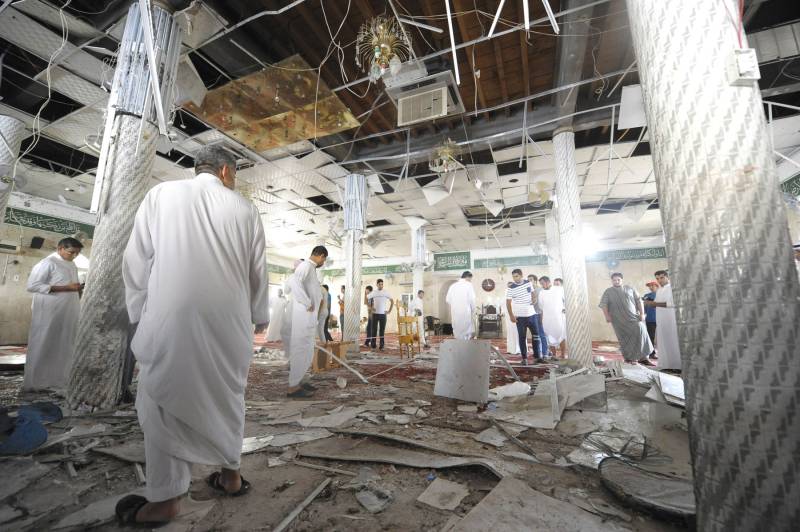RIYADH - An Islamic State group suicide bomber attacked a mosque in Saudi Arabia on Friday, killing and wounding several people in an assault that threatens to fan sectarian tensions.
The bomber struck during the main weekly prayers in Eastern Province, where assailants linked to the IS killed seven members of the minority Shiite community in November.
The interior ministry said a suicide bomber detonated a bomb at the mosque in Kudeih, in the Shiite-majority city of Qatif, the official SPA news agency reported. “An individual detonated a bomb he was wearing under his clothes during Friday prayers at Ali Ibn Abi Taleb mosque in Kudeih in Qatif,” the ministry spokesman said in a statement.
He did not give a specific casualty toll, only that several people were killed and wounded.
In a statement published online, IS said it was behind the attack. It named the bomber as Abu Amer al-Najdi, and included a picture of him.
The statement - the first time the group had officially claimed an attack in Saudi Arabia - said “the soldiers of the Caliphate” were behind the attack by a suicide bomber “who detonated an explosives belt” in the mosque. It also pledged “dark days ahead” for Shiites until militants “chase them from the Arabian Peninsula”.
Shiite activists and witnesses gave conflicting tolls from the attack, with one saying four worshippers were killed and others speaking of 22 dead.
News websites in eastern Saudi Arabia posted photographs of bodies lying in pools of blood.
Qatif hospital issued an urgent call for blood donations and called in off-duty staff to cope with the high number of casualties, an activist said.
Naseema Assada, a resident of Qatif, said worshippers were celebrating the birth of revered Shiite Imam Hussein when the blast occurred.
“The people are very angry,” she said, adding that they tried to stop police from entering Kudeih.
Residents had feared such an attack was coming, she said, because the government was failing to curb hate speech on social media against the Shiite community which complains of marginalisation.
“We don’t want a repeat of what is happening in Syria or Iraq here,” she said, referring to the jihadist IS that has declared a “caliphate” in those countries. “This is our country and we love it.”
The mufti of Saudi Arabia, the highest-ranking Sunni cleric, denounced the attack. “It is a criminal act aimed at dividing the sons of the nation... and at sowing trouble in our country,” he said on state television. The attack comes as a Saudi-led coalition has since March 26 been bombing Shiite rebels in Yemen who have overrun much of the country and forced the government to flee abroad.
Analysts said radical Sunnis in the ultra-conservative kingdom consider Saudi Shiites to be allies of the Yemen Huthi rebels.
“This (attack) was unfortunately only a matter of time,” said Frederic Wehrey, a Gulf analyst at the US-based Carnegie Endowment for International Peace.
Shiites have not joined in the “wave of Sunni nationalism” that has followed the Saudi-led campaign against the rebels in Yemen, and are considered by radical Salafists as a “fifth column” for the Huthis.
The interior ministry spokesman said Saudi Arabia would “hunt down anyone involved in this terrorist crime carried out by people seeking to undermine national unity.” The website of Arryadh newspaper posted pictures showing bloodied prayer rugs and part of the ceiling of the mosque that had caved in.
First reports by witnesses said the suicide bomber appeared to be from Pakistan, but others said he was wearing traditional Afghan clothing.
Eastern Province is an oil-rich region populated by many Shiites. It has been rocked by sporadic protests and attacks on security forces since 2011.
In recent months Saudi police have made a string of arrests of Sunni extremists suspected of plotting attacks aimed at stirring sectarian unrest in the province. Last November, gunmen killed seven Shiites, including children, in the eastern town of Al-Dalwa during the commemoration of Ashura, one of the holiest occasions of their faith.
Four men carried out the attack after killing a man from a neighbouring village and stealing his car to use in the shootings, the interior ministry said.
It said the assailants had links with IS, which considers Shiites to be heretics.
UN SLAMS TERRORIST ATTACK
Special Correspondent from United Nations adds: UN Secretary-General Ban Ki-moon has condemned “in the strongest terms” Friday’s terrorist attack targeting a Shia mosque in the town of al-Qudaih in the Eastern Province of the Kingdom of Saudi Arabia, and called for bringing the culprits to justice.
At least 10 people were killed and many more injured in the attack as people were gathering for Friday prayers.
“The Secretary-General stresses that such attacks on places of worship are abhorrent and intended to promote sectarian conflict,” a statement read out by United Nations Deputy Spokesman, Farhan Haq, said in a statement read out at the regular noon briefing.
“The Secretary-General extends his sincere condolences to the families of the victims and expresses his sympathies to the Government and people of the Kingdom of Saudi Arabia,” the statement said.
Friday, April 19, 2024
IS bomber in deadly strike on Saudi mosque

1:04 AM | April 19, 2024
Kite tragedy
April 19, 2024
Discipline dilemma
April 19, 2024
Urgent plea
April 19, 2024
Past in Perspective
April 19, 2024
Hepatitis Challenge
April 18, 2024
IMF Predictions
April 18, 2024
Wheat War
April 18, 2024
Rail Revival
April 17, 2024
Addressing Climate Change
April 17, 2024
Justice denied
April 18, 2024
AI dilemmas unveiled
April 18, 2024
Tax tangle
April 18, 2024
Workforce inequality
April 17, 2024
New partnerships
April 17, 2024
ePaper - Nawaiwaqt
Advertisement
Nawaiwaqt Group | Copyright © 2024





